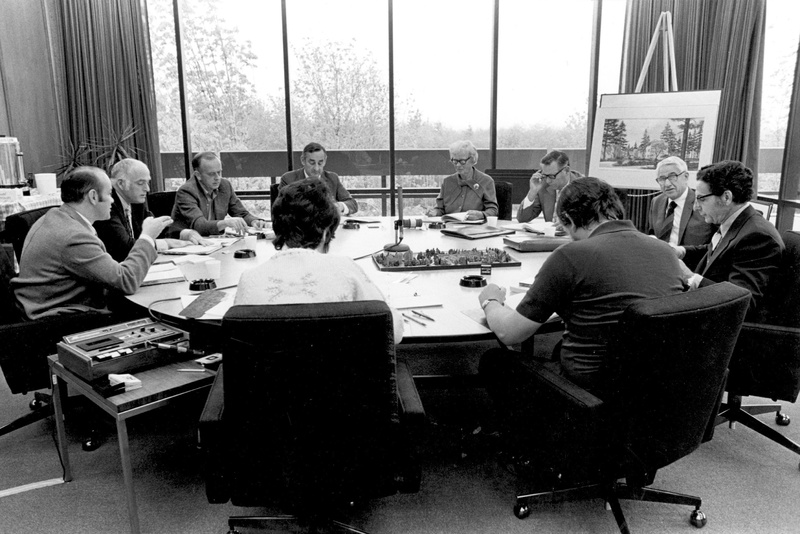Founding Visionaries
What we know today as Coordinated Studies and Contracted Studies can trace multiple root systems. The best known roots are two celebrated experiments in higher education reform. Both focused on general education through a “great books” curriculum that invited an usual degree of freedom for students to take command of their education, and demanded an extraordinary level of collaboration and coordination among faculty. Both were considered failures in their day, insofar as they set out to alter the status quo in research universities, and the mission and vested interests of the universities ran at odds with the spirit and intention of the experimental programs. At the same time, many of the pedagogical and structural innovations generated in these experiments are considered best practices today: group projects, community-based assignments, inquiry across disciplines, self-reflective writing, and learning communities.
Alexander Meiklejohn, The Experimental College
University of Wisconsin, 1927-1931
Joseph Tussman, Experiment at Berkeley
University of California, 1965-1969
Many people in Thurston County and across the state advocated throughout the 1960s to create a new public university.
Governor Daniel J. Evans worked closely with State Senator Gordon Sandison, Port Angeles, Chair of the Temporary Advisory Council on Public Higher Education to create the founding legislation.
Governor Evans appointed the founding Board of Trustees:
Trueman “Blink” Schmidt, Olympia (Founding Chair, 2-year term)
Vice-President, Olympia Brewery
Alfred E. Saunders, Tacoma (3-year term)
President, Puget Sound National Bank
Janet Tourtelotte, Seattle (4-year term)
She replaced Representative Mary Ellen McCaffree after it became apparent that holding elected office could create impression of conflict of interest on the Board
Halvor Halvorson, Spokane (5-year term)
General Contractor
Herbert D. Hadley, appointed October 1968 to fill the 6-year term of
Roger F. Camp, Vancouver, following his death
Dean Clabaugh was appointed the first employee of the College in 1967, as Executive Assistant to the Trustees and later Executive Director, eventually becoming Vice President for Business
Charles McCann, Founding President, appointed November 1, 1968
President McCann worked with the Academic Planning Committee, a panel of national experts on innovation in higher education, during the 1968-1969 academic year. Membership included:
David G. Barry, Vice President and Provost, The Evergreen State College
Prior to Evergreen, Barry was Dean of the School of Mathematics and Natural Sciences and Interim Executive Vice President at San Jose State College.
John Bevan, University of the Pacific
Professor of Psychology at Heidelberg College, Davidson College, and Duke University. Founding Vice President of Eckerd College in St. Petersburg, Florida and similar roles at The College of Charleston, Davidson College, and the University of the Pacific.
Ernest Boyer, State University of New York at Albany
PhD, speech pathology and audiology. In the early 1960s, Director of the Center for Coordinated Education at UC Santa Barbara. In the late 1960s, Chancellor of the State University of New York, where he created the Empire State College. He became U.S. Commissioner of Education from 1977 to 1979 and President of the Carnegie Foundation for the Advancement of Teaching from 1979 to 1995.
Stanley Idzerda, College of St. Benedict
President College of Saint Benedict from 1968 through 1974.
Roger Malek, Arthur D. Little, Inc. San Francisco
The Washington State Legislature, and later the Trustees of The Evergreen State College, contracted with Arthur D. Little to produce multiple studies leading up to the opening of the College, on topics including policy, curriculum, areas of student demand, library resources, and funding models.
Warren Bryan Martin, Research Educator, University of California at Berkeley
In the late 1960s, a researcher at the Center for Research and Development in Higher Education at the University of California at Berkeley. Founding Provost at Raymond College at the University of the Pacific and Provost of The Old School and Professor of History at Sonoma State University. Director of the Graduate Fellowship program at the Danforth Foundation and Scholar in Residence at the Carnegie Foundation.
John Stewart, John Muir College
Founding provost of John Muir College at the University of California, San Diego and champion of environmental education.
John Silber, University of Texas
(1926 – 2012) PhD Philosophy. Dean of the College of Arts and Sciences at University of Texas. From 1971 to 1996, he served as President of Boston University and from 1996 to 2002 as Chancellor.
William Warren, Antioch College
Doctorate of Education in counseling psychology. At Antioch he helped build the First Year Program, supported experimental programs, and advocated for students to take responsibility for their own education.
Robert Jenks, graduate student - University of California
Tim Dugan, student (senior) – University of Washington
Carl Mills, student (senior) - Central Washington State College
J. Maarten Ultee, student (senior) - Reed College
President McCann’s initial leadership team included
David G. Barry, Vice President for Academics and Provost
Edward Joseph Shoben, Jr., Executive Vice President for Administration
Dean Clabaugh, Vice President for Business
